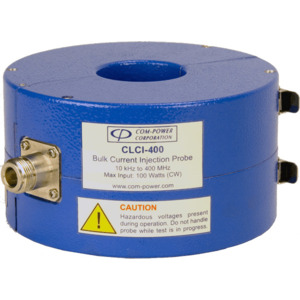
- Description
- Attributes
- Documents
The CLCI-400 Bulk Current Injection Probe is designed for performing conducted susceptibility tests according to RTCA DO-160, Section 20; as well as MIL-STD-461 (CS114, CS115 and CS116).
Its efficient operation over its wide frequency range of 10 kHz to 400 MHz enables it to easily achieve the test levels for even the most stringent respective category/ curve in each of the above standards with less than 60 watts forward power delivered to the probe input.
The CLCI-400 incorporates split-core ferrites into its rugged, circular enclosure. The probe enclosure is hinged, allowing the probe to be opened on one side in order to easily place the wire, cable(s) or cable bundle(s) to be tested into the probe window. This makes the CLCI-400 much more convenient to use than other non-split core probes.
Application
In general, RF current probes are employed either to measure RF current flow on a wire, cable or cable bundle; or to do the opposite, inject RF energy onto a wire, cable, or cable bundle. The current is measured (or injected) inductively by clamping the probe around the line(s) to be tested.
Essentially, a current probe is a torroidal transformer. When used to inject current, the probe acts as the primary, and the line(s) under test act as the secondary. When used as a measuring device, the roles are, of course, reversed.
While the CLCI-400 is designed to be used as an injection probe, it may also be used as a current monitoring probe; with some sacrifice in sensitivity compared most current monitoring probes.
When used for monitoring, the probe’s output voltage is measured across the 50Ω input impedance of the measuring instrument, which can then be converted to a current quantity using the transfer impedance factor of the probe.
